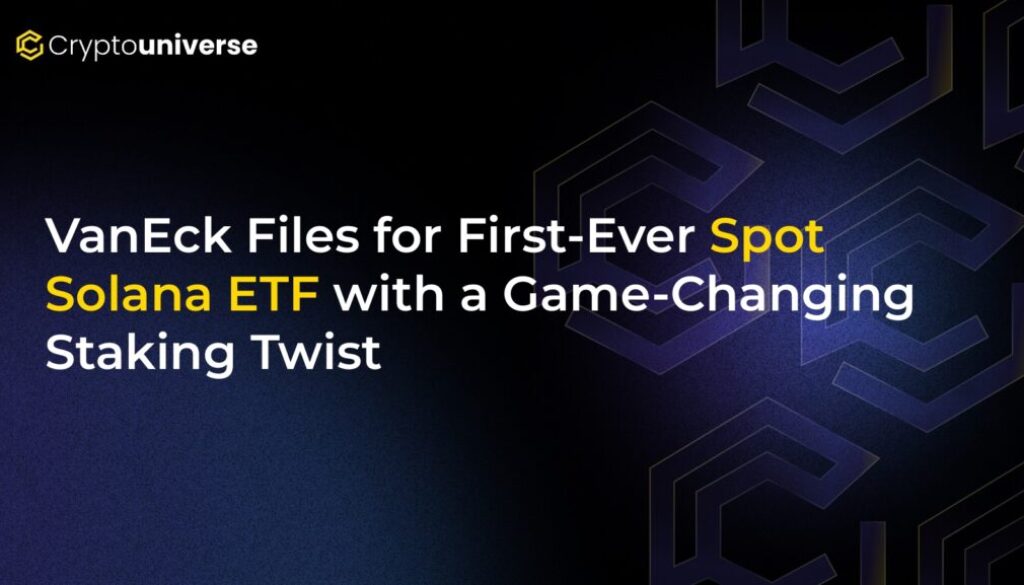VanEck Files for First-Ever Spot Solana ETF with a Game-Changing Staking Twist

Wall Street Giant VanEck Makes a Bold Move on Solana
The crypto world is buzzing with excitement after global investment manager VanEck submitted a groundbreaking filing to the U.S. Securities and Exchange Commission (SEC). The proposal? To launch the first-ever spot Solana (SOL) exchange-traded fund (ETF). But this isn’t just another crypto ETF application; VanEck is introducing a revolutionary feature that could reshape how traditional investors interact with digital assets: liquid staking.
This move signals a major vote of confidence in the Solana ecosystem and represents the next evolutionary step in bridging the gap between decentralized finance (DeFi) and traditional financial markets. If approved, the VanEck Files for First-Ever
More Than Just Price Exposure: The JitoSOL Advantage
What makes VanEck’s proposal stand out is its unique structure. Instead of simply holding SOL, the ETF is designed to track JitoSOL (JSL), a liquid staking token (LST) from the Jito Network, a prominent protocol on Solana.
So, what does this mean for potential investors? Let’s break it down:
- What is Staking? Staking is the process of locking up cryptocurrency to help secure and operate a blockchain network. In return, participants receive rewards, similar to earning interest in a savings account.
- What is Liquid Staking? Traditionally, staking meant your funds were locked and couldn’t be used. Liquid staking solves this. When you stake your SOL with a protocol like Jito, you receive JitoSOL tokens in return. These tokens represent your staked SOL and automatically accumulate staking rewards while remaining liquid—meaning you can trade or use them elsewhere in the DeFi ecosystem.
By building the ETF around JitoSOL, VanEck is offering investors a dual benefit: exposure to the price movements of Solana and the ability to earn passive income from staking rewards, all packaged within a familiar, regulated financial product.
Why This Filing is a Landmark Moment for Crypto
VanEck’s innovative approach is significant for several key reasons. It represents a maturation of crypto-based financial products and could set a powerful precedent for future ETF filings.
1. Bridging DeFi and Traditional Finance (TradFi)
This is one of the first times a core DeFi mechanism—liquid staking—has been integrated directly into a major U.S. ETF proposal. It shows that institutional players are not just looking to offer simple price exposure but are embracing the more sophisticated, yield-generating aspects of the crypto economy. This is truly where “Staked Solana meets Wall Street.”
2. The Allure of Native Yield
The recent spot Bitcoin ETFs were a massive success, but they offer no yield. The potential for staking rewards baked into the Solana ETF could make it a far more attractive product for a wider range of investors, especially those seeking income-generating assets. This feature could give it a significant competitive edge.
3. A Major Endorsement for the Solana Ecosystem
VanEck’s choice of Solana and, more specifically, the Jito Network, is a powerful endorsement. It brings legitimacy and spotlights the innovation happening within the Solana ecosystem. An approved ETF would likely drive significant capital inflows into SOL and related projects, potentially boosting the entire network’s value and activity.
The Road Ahead: Regulatory Hurdles Remain
While the filing is a cause for celebration, the path to approval is anything but certain. The SEC has historically been cautious with crypto products beyond Bitcoin and Ethereum. The regulatory status of Solana itself remains a key question, as the SEC has previously suggested in lawsuits that SOL could be considered an unregistered security.
However, the recent approval of spot Ethereum ETFs has created a more optimistic regulatory environment. The industry will be watching closely to see how the SEC treats this novel proposal, which combines a spot asset with a staking component.
For now, the filing of the VanEck Files for First-Ever


